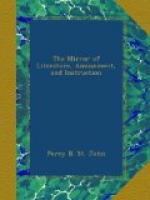During his retirement on the Continent, Sir Humphry continued to communicate the splendid results of his labours to the Royal Society, and at the anniversary meeting of the year 1827, the royal medal was awarded to him for a series of brilliant discoveries developing the relation between electricity and chemistry.[5] Upon this interesting occasion, Mr. Davies Gilbert spoke at some length, commencing as follows: “It is with feelings most gratifying to myself that I now approach to the award of a royal medal to Sir Humphry Davy; and I esteem it a most fortunate occurrence, that this award should have taken place during the short period of my having to discharge the duties attached to the office of president; having witnessed the whole progress of Sir Humphry Davy’s advancement in science and in reputation, from his first attempts in his native town to vary some of Dr. Priestly’s experiments on the extraction of oxygen from marine vegetables to the point of eminence which we all know him to have reached. It is not necessary for me more than to advert to his discovery of nitrous oxyde; to his investigation of the action of light on gases; on the nature of heat; to his successful discrimination of proximate vegetable elements; nor to his most scientific, ingenious, and useful invention, the safety-lamp,—an invention reasoned out from its principles, with all the accuracy and precision of mathematical deduction.”
The course of Sir Humphry Davy to the highest rank as a chemical philosopher, was, after his appointment at the Royal Institution, rapid and brilliant; and if he was previously aided by as few of the advantages of fortune as any man living, he had then at his disposal whatever his industry and talents chose to command. We have given but a hasty outline of his labours; but it is possible that he may have left behind him much, not yet made public, for which, science will be still further indebted to him. His works, papers, and letters are numerous, and the greatest portion of them are contained in the Transactions of the Royal Society. One of the most popular and interesting of his recent papers is that on the Phenomena of Volcanoes. This contains a series of investigations of Vesuvius, made by the author during a residence at Naples in 1819-20, and bearing upon a previous hypothesis, “that metals of the alkalies and earth might exist in the interior of the globe, and on being exposed to the action of air and water, give rise to volcanic fires, and to the production of lavas, by the slow cooling of which basaltic and other crystalline rocks might subsequently be formed.” We have not space for the details of these investigations, interesting as they would prove to an unscientific reader; but we give an abstract of the result of Sir Humphry’s observations:




